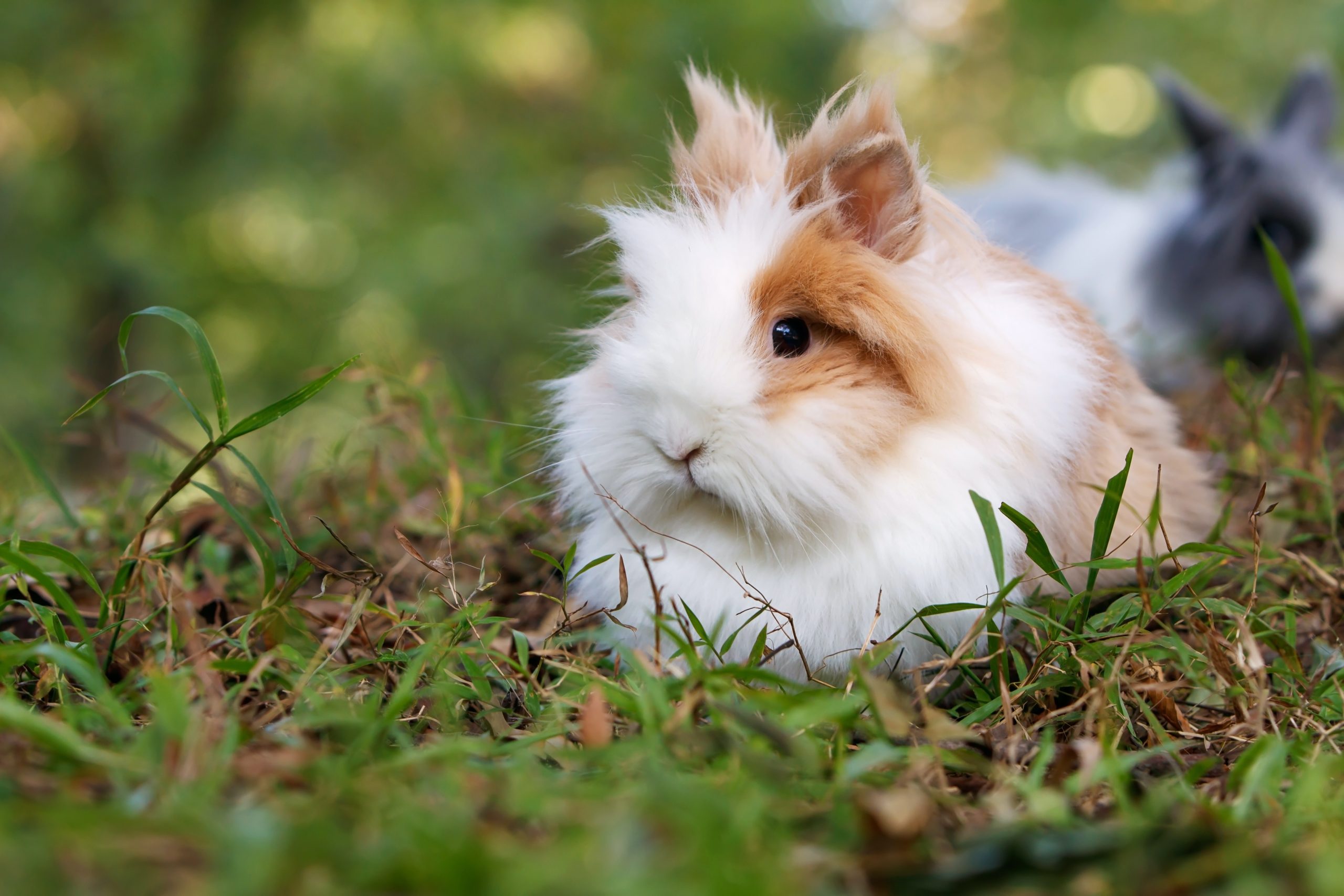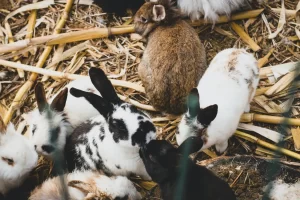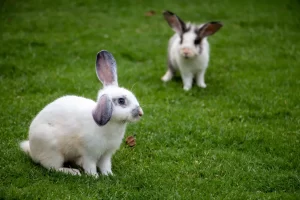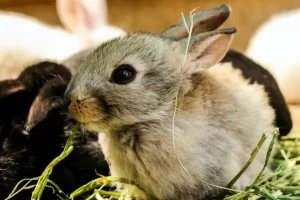Imagine having a little ball of fur that brings joy and companionship into your life. With proper care, your lionhead rabbit can thrive and become a cherished member of your family.
In this article, you will discover the essential steps to ensure your lionhead rabbit’s happiness and well-being. From creating a suitable habitat to providing the right diet and grooming, we will guide you through every aspect of caring for your adorable and enchanting lionhead rabbit.
Get ready to embark on this rewarding journey of serving your furry friend.
In This Article
- 1 Key Takeaways
- 2 Understanding the Lionhead Rabbit Breed
- 3 Creating a Suitable Habitat for Your Lionhead Rabbit
- 4 Providing the Right Diet for Your Lionhead Rabbit
- 5 Grooming and Maintaining Your Lionhead Rabbit’s Fur
- 6 Ensuring Proper Hygiene and Health Care for Your Lionhead Rabbit
- 7 Socializing and Bonding With Your Lionhead Rabbit
- 8 Exercise and Enrichment for Your Lionhead Rabbit’s Well-being
- 9 Common Challenges and Troubleshooting for Lionhead Rabbit Care
- 10 Frequently Asked Questions
- 10.1 Can a Lionhead Rabbit Be Kept in a Small Cage or Does It Require a Larger Space?
- 10.2 How Often Should I Groom My Lionhead Rabbit’s Fur?
- 10.3 Are There Any Specific Health Issues That Are Common in Lionhead Rabbits?
- 10.4 Can Lionhead Rabbits Be Litter Trained?
- 10.5 Is It Necessary to Neuter or Spay a Lionhead Rabbit?
- 11 Conclusion
Key Takeaways
- Lionhead rabbits require a spacious enclosure with various toys and tunnels for entertainment.
- Their diet should include a mix of leafy greens, vegetables, and high-quality rabbit pellets.
- Regular grooming is necessary to prevent matting and maintain their fur.
- It is important to provide proper hygiene, regular veterinary care, and socialization for the well-being of Lionhead rabbits.
Understanding the Lionhead Rabbit Breed
You should know that Lionhead rabbits come in a variety of colors, with over 25 recognized color varieties. These adorable rabbits are known for their distinctive mane of fur around their head, which resembles that of a lion. The Lionhead rabbit breed is relatively new, with its origins dating back to the 1990s in Belgium. The breed was created by crossing a Netherland Dwarf rabbit with a Swiss Fox rabbit, resulting in a small, compact rabbit with a unique appearance.
Lionhead rabbits have several distinctive breed characteristics. Apart from their iconic mane, they’ve a small, compact body with a rounded face and short ears. They also have a friendly and sociable nature, making them great pets for both individuals and families.
Understanding the history and characteristics of the Lionhead rabbit breed is essential in providing them with the appropriate care and environment they need. With their unique appearance and friendly temperament, these rabbits are sure to bring joy and companionship to anyone who chooses to care for them.
Creating a Suitable Habitat for Your Lionhead Rabbit
To ensure the comfort and well-being of your Lionhead rabbit, it’s important to create a suitable habitat that includes a spacious enclosure and plenty of enrichment activities.
Creating a comfortable living space starts with choosing the right enclosure. Opt for a cage that allows your rabbit to hop, stretch, and explore. A minimum size of 4 square feet is recommended, but the more space, the better.
Lionhead rabbits are active and curious, so providing them with various toys and tunnels will keep them entertained.
When it comes to bedding, avoid cedar and pine shavings, as they can be harmful to your rabbit’s respiratory system. Instead, choose bedding made from paper or straw.
Regularly clean the enclosure and change the bedding to maintain a hygienic and odor-free environment.
Providing the Right Diet for Your Lionhead Rabbit
Feed your Lionhead rabbit a balanced diet consisting of a variety of fresh vegetables and a limited amount of pellets. Here are some lionhead rabbit feeding tips to help keep your furry friend healthy and happy:
- Vegetables:
- Offer a mix of leafy greens such as romaine lettuce, kale, and spinach.
- Include other vegetables like carrots, bell peppers, and broccoli for added nutrients.
- Pellets:
- Choose high-quality rabbit pellets that are specifically formulated for dwarf rabbit breeds like the Lionhead.
- Look for brands such as Oxbow Essentials and Kaytee Forti-Diet that provide the necessary nutrients and fiber.
Remember to introduce new foods gradually to avoid digestive problems. Provide unlimited fresh water and occasional treats like small pieces of fruits. It’s important to consult with a veterinarian for personalized advice based on your rabbit’s specific dietary needs.
Grooming and Maintaining Your Lionhead Rabbit’s Fur
When grooming and maintaining your Lionhead rabbit’s fur, use a gentle brush to prevent matting and tangles, but be careful not to pull on their delicate fur. Lionhead rabbits have long, dense fur that requires regular grooming to keep it healthy and free from mats.
Start by gently brushing their fur in the direction it naturally grows, using short strokes. This will help remove loose fur and prevent tangles. Pay special attention to areas like the belly, behind the ears, and under the chin, as these areas are prone to matting.
If you encounter a tangle, use your fingers or a wide-toothed comb to carefully work it out, being cautious not to pull on the fur.
Regular grooming won’t only keep your Lionhead rabbit looking beautiful, but it will also help prevent the formation of painful mats that can lead to skin issues.
Ensuring Proper Hygiene and Health Care for Your Lionhead Rabbit
Make sure you regularly clean your Lionhead rabbit’s living area to maintain proper hygiene and prevent any potential health issues. A clean environment is essential to keep your rabbit healthy and happy.
Here are some hygiene practices and health check-ups you should follow:
- Cleaning the living area
- Regularly remove soiled bedding and replace it with fresh, clean bedding.
- Clean the litter box daily to prevent the buildup of waste and bacteria.
- Grooming and hygiene
- Brush your Lionhead rabbit’s fur regularly to prevent matting and remove loose hair.
- Check your rabbit’s ears for any signs of infection or mites and clean them gently if needed.
- Health check-ups
- Schedule regular visits to a qualified veterinarian for health check-ups and vaccinations.
- Monitor your rabbit’s eating habits, weight, and overall behavior to detect any signs of illness early.
Socializing and Bonding With Your Lionhead Rabbit
You should spend at least 30 minutes each day socializing and bonding with your Lionhead rabbit to strengthen your relationship and provide mental stimulation for them.
Bonding is crucial for creating a trusting and loving connection with your rabbit. To bond with your Lionhead, start by sitting or lying down near them, allowing them to approach you at their own pace. Speak softly and gently stroke their fur to build trust and familiarity. Offer them treats, such as fresh vegetables, to associate positive experiences with your presence.
Additionally, introducing other pets to your Lionhead should be done gradually and carefully. Always supervise interactions and ensure the safety of both your rabbit and the other pet.
Following these bonding techniques and introducing other pets in a controlled manner will enhance your relationship with your Lionhead rabbit.
Exercise and Enrichment for Your Lionhead Rabbit’s Well-being
To ensure the well-being of your Lionhead rabbit, provide regular exercise and enrichment activities to keep them mentally and physically stimulated. Mental stimulation is just as important as physical exercise for your furry friend.
Here are some playtime activities you can engage in with your Lionhead rabbit:
- Interactive Toys:
- Provide your rabbit with puzzle toys that require problem-solving skills to access treats or rewards.
- Offer chew toys made of safe materials like wood or hay to keep their teeth healthy and provide mental stimulation.
- Agility Training:
- Set up a small obstacle course using tunnels, ramps, and low jumps to encourage your rabbit to explore and navigate different challenges.
- Use positive reinforcement, such as treats and praise, to motivate and reward your rabbit’s efforts.
Engaging in these mental stimulation and playtime activities won’t only keep your Lionhead rabbit physically fit but also mentally engaged and happy.
Common Challenges and Troubleshooting for Lionhead Rabbit Care
Having a clear understanding of common challenges and troubleshooting techniques is essential for successfully caring for your Lionhead rabbit. When it comes to their health, there are several common issues that you may encounter.
One of the most common health issues in Lionhead rabbits is dental problems. Their compacted teeth can lead to pain, difficulty eating, and even abscesses. Regular dental check-ups and providing plenty of roughage in their diet can help prevent these issues.
Another challenge you may face is introducing your Lionhead rabbit to other pets. It’s important to introduce them slowly and in a controlled environment to ensure their safety. Always supervise interactions and provide separate spaces for each pet until they’re comfortable with one another.
Frequently Asked Questions
Can a Lionhead Rabbit Be Kept in a Small Cage or Does It Require a Larger Space?
A lionhead rabbit can be kept in a small cage, but it’s not ideal. Pros of a small cage include easier maintenance, while cons include limited space for exercise. An ideal cage size would be at least 4 square feet.
How Often Should I Groom My Lionhead Rabbit’s Fur?
To keep your lionhead rabbit’s fur looking its best, regular grooming is essential. You should groom their fur at least once a week using a soft brush or a slicker brush designed for small animals.
Are There Any Specific Health Issues That Are Common in Lionhead Rabbits?
To prevent dental problems in lionhead rabbits, it’s important to provide a balanced diet. Lionhead rabbits have a higher risk of dental issues compared to other breeds, so regularly check their teeth and offer appropriate chew toys.
Can Lionhead Rabbits Be Litter Trained?
Yes, lionhead rabbits can be litter trained. It’s a great way to keep their living area clean and minimize odors. Start by providing a litter box with appropriate litter and use positive reinforcement techniques to encourage them to use it.
Is It Necessary to Neuter or Spay a Lionhead Rabbit?
It is necessary to neuter or spay a lionhead rabbit for several reasons. It helps prevent health issues, reduces aggression, and eliminates the risk of unwanted pregnancies. If you prefer alternatives, consult with a veterinarian for guidance.
Conclusion
Taking care of a Lionhead rabbit requires understanding their breed. Providing a suitable habitat, feeding them a proper diet, grooming their fur, ensuring hygiene and health care, socializing and bonding with them, and providing exercise and enrichment.
For example, Sarah, a Lionhead rabbit owner, noticed that her rabbit became more active and social after implementing a daily playtime routine.
By following these guidelines, you can ensure the well-being and happiness of your adorable Lionhead rabbit companion.





